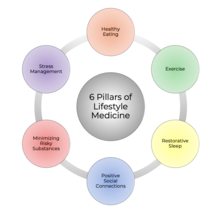
Back طب نمط الحياة Arabic Lebensstilmedizin German Vivstila medicino Esperanto Elämäntapalääketiede Finnish Életmódorvoslás Hungarian Medycyna stylu życia Polish Medicina stilului de viață Romanian 生活方式医学 Chinese
 The focus of Lifestyle Medicine is on these 6 pillars. | |
| Focus | nutrition, sleep, physical activity, stress management, tobacco/alcohol cessation, and healthy relationships.. |
|---|---|
| Significant diseases |
|
| Specialist | Lifestyle medicine physician |
Lifestyle medicine (LM) is a branch of medicine focused on preventive healthcare and self-care dealing with prevention, research, education, and treatment of disorders caused by lifestyle factors and preventable causes of death such as nutrition, physical inactivity, chronic stress, and self-destructive behaviors including the consumption of tobacco products and drug or alcohol abuse.[1] The goal of LM is to improve individuals' health and wellbeing by applying the 6 pillars of lifestyle medicine (nutrition, regular physical activity, restorative sleep, stress management, avoidance of risky substances, and positive social connection) to prevent chronic conditions such as cardiovascular diseases, diabetes, metabolic syndrome and obesity.[1][2]
Lifestyle medicine focuses on educating and motivating patients to improve the quality of their lives by changing personal habits and behaviors around the use of healthier diets which minimize ultra-processed foods such as a Mediterranean diet or whole food, plant-predominant dietary patterns. Poor lifestyle choices like dietary patterns, physical inactivity, tobacco use, alcohol addiction and dependence, drug addiction and dependence, as well as psychosocial factors, e.g. chronic stress and lack of social support and community, contribute to chronic disease.[1][3] In the clinic, major barriers to lifestyle counseling are that physicians feel ill-prepared and are skeptical about their patients' receptivity.[4] However, by encouraging healthy decisions, illnesses can be prevented or better managed in the long-term.
- ^ a b c Mechanick, Jeffrey I.; Kushner, Robert F., eds. (2016). "The Importance of Healthy Living and Defining Lifestyle Medicine". Lifestyle Medicine: A Manual for Clinical Practice. Cham, Switzerland: Springer Nature. pp. 9–15. doi:10.1007/978-3-319-24687-1. ISBN 978-3-319-24685-7. S2CID 29205050.
- ^ Lifestyle Medicine. Wiley. doi:10.1002/(issn)2688-3740.
- ^ Kvaavik, Elisabeth (April 2010). "Influence of Individual and Combined Health Behaviors on Total and Cause-Specific Mortality in Men and Women: The United Kingdom Health and Lifestyle Survey". JAMA Internal Medicine. 170 (8): 711–8. doi:10.1001/archinternmed.2010.76. hdl:10536/DRO/DU:30131641. PMID 20421558. Retrieved 7 July 2015.
- ^ Hivert, Marie-France; Arena, Ross; Forman, Daniel E.; Kris-Etherton, Penny M.; McBride, Patrick E.; Pate, Russell R.; Spring, Bonnie; Trilk, Jennifer; Horn, Linda V. Van; Kraus, William E.; Health, On behalf of the American Heart Association Physical Activity Committee of the Council on Lifestyle and Cardiometabolic; the Behavior Change Committee, a joint committee of the Council on Lifestyle and Cardiometabolic Health and the Council on Epidemiology and Prevention; the Exercise, Cardiac Rehabilitation; Nursing, and the Council on Cardiovascular and Stroke (1 January 2016). "Medical Training to Achieve Competency in Lifestyle Counseling: An Essential Foundation for Prevention and Treatment of Cardiovascular Diseases and Other Chronic Medical Conditions: A Scientific Statement From the American Heart Association". Circulation. 134 (15): e308–e327. doi:10.1161/CIR.0000000000000442. ISSN 0009-7322. PMID 27601568. S2CID 7847964.